- Home
- Lauren Oliver
The Fearsome Firebird Page 14
The Fearsome Firebird Read online
Page 14
“Do I look like your trained monkey?” Danny growled.
“Please,” Thomas said. “Just do it.”
Grumbling, Danny took a seat on the bench. This required him to clamber up on his hands and knees before sliding into a seated position. He didn’t, Max realized, look all that much shorter than Mallett. Danny was insecure about his size, which was a source of tension between him and his other dwarf friends, who felt he was too tall.
Thomas took a step back, squinting, and then grabbed a telephone book that was being used to correct an extremely wobbly table in the corner. He set it down on the bench and had Danny perch on top of it. Now Danny’s head and shoulders were visible above the table, just as Mallett’s had been. “Much better,” Thomas said. “Now pretend to shoot yourself in the chest.”
Danny made a gun with his pointer finger and thumb and held it to his chest—or at least Max thought he did, since even sitting on the phone book, most of Danny’s chest was invisible and she could see only the very tip of his thumb.
“Bang,” Thomas said, and then nudged Danny’s shoulder with a hand, indicating that he should slump forward onto the table—just as Mallett had done, so that his forehead was resting on the wood. His gun hand fell unseen on his lap, below the tabletop.
“Alas, poor Danny! Untimely death hath closed thine gentle eyes!” Smalls recited, clutching a massive fist to his chest.
Max felt a prickling sensation that began in her hands and then spread, as she always did when an idea was dancing just out of range—an itch to reach out and simply grab hold of it. Something was wrong with the picture, but she couldn’t make the thing, the wrongness, come to light.
Danny turned his head, still pressed to the tabletop. “Can I sit up now?”
“One more second,” Thomas said. He turned to the others triumphantly. “You see?”
Sam frowned. “Not really,” he said.
Thomas smiled. “The police report says that Mallett died instantly,” he said, and pointed to the grainy picture of Mallett, his forehead resting atop his cluttered desk, with his hand, still clutching the gun, a few inches away. And suddenly the itchy feeling turned, for Max, into a full-on burst of understanding.
“I don’t get it,” Pippa said crossly.
“Gravity,” Thomas said. “Mallett’s hand would have dropped onto his lap after he shot himself. But in the picture, his hand is lying on his desk. Which means he would have had to raise his hand—after he was dead.”
“Murder,” Smalls whispered. “Murder most foul.”
“Murder,” Pippa repeated in a whisper. Then she snatched the newspaper, as if she would find evidence in it that Thomas was wrong.
Sam’s expression was grim. “Mallett and Erskine’s murders have to be connected. And there’s no way Farnum could have done it—he’s been locked up this whole time.” He looked around at the others. “We’ve got to talk to Rosie Bickers. We’ve got to tell her.”
Max made a face. “What’s she going to do? She’s been exactly no help so far.”
Sam rolled his eyes. “You just don’t like her.”
“So?” Max fired back.
“So?” He threw up his hands. “You don’t like anyone.”
Thomas expected Max to snap back. Instead, she just turned and made a strange face, as if she’d accidentally taken a gulp of sour milk. “That’s not true,” she said shortly.
“Oh, sorry.” Sam rolled his eyes. “You don’t like anyone except for Howie.”
“If you say his name one more time,” Max said in her normal tone of voice, which was somewhere between a grunt and a snarl, “I’ll take your tongue out through your nostrils.”
“Technically speaking, that’s not physically possible,” Thomas felt compelled to say, and then quickly shut his mouth when Max glared at him.
Pippa was doubled over the article about Mallett’s death, her long black bangs hanging down over her eyes, her nose skimming only an inch above the ink.
“What happened to your sensitive stomach?” Thomas asked.
But Pippa ignored him. Suddenly, she let out a short cry and sprang up from her seat. “A magnifying glass,” she said. “I need a magnifying glass!”
By this time, most of the residents of the museum had come down to breakfast, and Pippa’s sudden demand provoked a babble of responses. Smalls offered to lend his reading glasses, which proved totally useless. Danny suggested that she use a juice glass, tipped upside down, which proved even more so. Betty said that Pippa would ruin her eyes, and the twins gloatingly implied that she was already getting frown marks just from squinting so long at the newspaper. Nobody had a magnifying glass, in any case, although the children were temporarily encouraged by Goldini’s appearance, since he always had a bunch of odds and ends concealed in his vest and waist pockets. But after a thorough search, he produced nothing but some trick coins, five aces of spades, a long multicolored handkerchief, and, in a hidden pocket he had entirely forgotten about, an Easter egg, dyed a mottled red color.
At last Thomas had the idea to look in the chamber of horrors portion of the Hall of Wax and discovered a magnifying glass clutched in the wax fist of the famous surgeon Joseph Bell, on whom the character Sherlock Holmes had supposedly been modeled.
Immediately, Pippa dropped to her knees and flattened the newspaper on the floor, once again peering at the photograph showing poor Benny Mallett’s body. They were all alone in the Hall of Wax, which on the busiest days was one of the museum’s most popular exhibits. Now, however, in the early morning, it was dark, full of shadows and echoes. All of the dozens of wax figures, many of them created by Siegfried “Freckles” Eckleberger, stared out from their displays with blank, unseeing eyes. Though he knew it was stupid, Thomas couldn’t shake the feeling that they really could see him—that they were watching.
“I knew it.” Pippa leaned back on her heels. Her face was flushed. “I wasn’t sure before, but now it’s clear as anything.”
“What’s clear?” Max said, shouldering Pippa out of the way and snatching the magnifying glass.
But just then there was a loud commotion from upstairs, and they were temporarily distracted by the colorful string of curses coming from the attic. There they found Lash Langtry trying to wrangle the Firebird back into its cage.
“What happened?” Thomas asked.
Lash was sweating as he strained to force the frantically flapping bird to pass through the narrow cage entrance. “Mr. Dumfrey left the cage open after a feeding,” he said, grunting with exertion as the bird squawked and protested. “The filthy varmint tried to make a break for it.”
“And you brought it back?” Max asked in a tone of disbelief. Thomas had to agree with her: so far, the Firebird had proven to be nothing but a pain. Even Cornelius, Mr. Dumfrey’s pet cockatoo, was so angry about the new arrival that he would do nothing but chirp the same song over and over again, an awful dirge called “Why the Caged Bird Weeps.”
They got back to reading the newspaper. Max, who still had the magnifying glass, spread the photo on the floor of the attic and kneeled over it. “What am I supposed to be looking at?”
“You’re not supposed to be looking at anything,” Pippa said, snatching back the glass. “What you are looking at are gum wrappers. Five of them, Tendermint brand, sitting right on top of the wastepaper basket.”
They took turns with the magnifying glass. Pippa was right. Crumpled at the very top of the collection of old envelopes and unpaid invoices were the same wrappers that Sir Barrensworth had left in Mr. Dumfrey’s wastebasket.
“It could be a coincidence,” Sam said. “Ten thousand people might chew Tendermint gum. Maybe Mallett liked it.”
“I’ve never heard of it,” Pippa said. “Besides”—she wrinkled her nose—“I got the feeling Mallett hadn’t gone near a mint—or a toothbrush—in days.”
“It doesn’t make any sense.” Max crossed her arms, blowing her tangled bangs out of her face. “What’s in it for Sir Barrenswott or whatever his name is
if he bumps off Mallett?”
“I don’t know,” Pippa admitted. Her chin was inching incrementally into the air. When she was extremely angry, you could see all the way up her nostrils. “Didn’t he just get back from Africa?”
“So he claims,” Thomas said. Something was bugging him: he could feel a corner, an angle of the picture that wasn’t aligning right. Or maybe he was the one who wasn’t aligning things correctly. He was missing something important.
What had started as a simple enough problem—to prove that Farnum didn’t kill Ernie Erskine—had taken so many sharp pinwheel turns to the left, Thomas now felt almost totally lost. And Rattigan was still out there, plotting something, free from police interference. Thomas was sure of it. They should be spending their time trying to find him. But now that they’d started down this road, they couldn’t just turn back—no matter how twisty and difficult the road had become.
Pippa shrugged. “Maybe Barrensworth was settling an old score.”
“So Mallett and Erskine’s deaths aren’t related?” Sam said, scratching his head.
Even Pippa had to admit that seemed unlikely. What had felt like an electrifying breakthrough now seemed to be another dead end. Still, Thomas kept having the poky sense that he was missing some fact or connection—but every time he reached and stretched for it, it was like bending backward too far and coming face-to-face with nothing but floor.
He closed his eyes. Sir Barrensworth . . . the Firebird . . . the mess of papers on Mallett’s desk . . . mess . . . messy pockets . . .
Bing. Just like that, a small alarm went off in his head.
He opened his eyes. “Pippa,” he said excitedly, “remember when you read Sir Barrensworth’s pockets?”
“Unfortunately,” she said, shuddering.
“Can you remember everything he had in them?”
She narrowed her eyes suspiciously. “More of that gum, for starters,” she said. “And—I don’t know—the usual stuff. Loose coins. Pen caps. Subway tokens and ferry stubs—”
“Which ferry?” Thomas asked. Now Sam and Max were staring at him, too.
“Don’t be a pill,” Pippa said. “You know very well which ferry. There’s only one, and it goes to Staten Island. So just tell us what you’re thinking.”
Thomas felt a warm rush all the way to his fingers, as he did whenever he was closing in on the solution to a complicated math problem, or when he had just managed to free himself from a particularly small and airless space. “Mallett told us he couldn’t get any supply of the poison he needed,” he said. “He told us some kingpin on Staten Island was buying it up by the truckloads. Well, Sir Barrensworth has been going back and forth to Staten Island.”
“You think Sir Barrensworth was Mallett’s big competition?” Max said.
“Maybe,” Thomas said. “Or maybe he works for the competition.” He’d only met Sir Barrensworth the day before, and then only briefly, but he hadn’t gotten the impression of any great intelligence. The Firebird hadn’t shown any signs of improving its attitude, either, despite Sir Barrensworth’s offer to help. The bird had spent half the night letting off a stream of words, most of them curses.
Sam shook his head. “But why kill him, then? The poor guy was already deep in the hole. You heard what Mallett said. He was done for.”
“I don’t know,” Thomas said firmly, even as he was making his way to the stairs. “But we need to talk to Bickers. Maybe she can find out.” When Max opened her mouth to protest, Thomas quickly cut her off. “I don’t care if you like her or not,” he said. “It’s the only way.”
“Who’re you calling filthy, you stinking hunk of beef jerky?” the bird shrieked.
“Beef jerky, huh?” Finally, Lash managed to force the bird onto its perch and shut and latched the cage door, but not without accidentally detaching one of the Firebird’s extraordinary rainbow-colored feathers. The bird, however, hardly seemed to notice. Puffed up with outrage, it continued insulting Lash in its large and colorful vocabulary, sticking to a theme of Lash’s poor personal hygiene and general stupidity.
Lash stood up wearily, dusting off his knees. “Should have let the darned thing fly off, as far as I’m concerned,” he said. “Been nothing but trouble since it came through those doors.”
“Look on the bright side,” Thomas said. “Thanksgiving’s not that far away. And I bet Firebird tastes great with cranberry sauce.”
“Mmm, I’m not so sure,” Pippa said, raising an eyebrow, as the bird continued to huff and swear. “I think it might leave a very bad taste in the mouth.”
They hadn’t taken two steps out the door when Sam stopped short, causing Thomas to run directly into him—which felt a little bit like running straight into a cement wall.
“Ow,” Thomas said, rubbing his elbow, which had made impact with Sam’s lower back. “What’s the matter with you?”
Sam didn’t take his eyes off the street. “I don’t believe it,” he murmured.
Thomas followed the direction of his gaze and saw nothing out of the ordinary. Emily was leaning against the gate—wearing not her typical long-sleeved, ankle-length coat but a simple day dress whose sleeves reached only to the elbow, leaving many of her vibrantly colored tattoos on display—talking and laughing with an unfamiliar man wearing a dusty hat. Every so often, a passerby would swivel around to stare at the coils of color looping around her wrists and ankles—as, in fact, Mr. Dumfrey had hoped they would. He had actually suggested that Emily should start spending part of her lunch breaks outside, as a form of free advertisement for the museum.
“What?” Thomas’s elbow ached and he was annoyed about it. “I don’t see what’s so special about . . .” But then the man in the hat turned slightly, so that the shadows fell across his face differently, and the words died in Thomas’s throat. He stood there gaping next to his friends.
The man was none other than Gil Kestrel, the perpetually foul-tempered janitor. He had been momentarily unrecognizable for the simple but absolutely astounding fact that he was smiling.
Never once since Kestrel had joined up with the museum had Thomas ever seen Kestrel crack a smile—not when the twins had fumbled a step during a complicated pas de deux and ended up flat on their backs with their legs, still in unison, kicking in the air; not when Smalls and Danny, for a joke, had posed as mannequins in the Hall of Wax and spent the morning jumping out at people; not even when one of Goldini’s doves had swooped off the stage and snatched the toupee off of a man in the front row who had been complaining loudly about the poor quality of the acts. So bizarre, so totally unexpected, was this change that it made Kestrel look like a stranger.
Even weirder was the fact that, just after spotting the kids, he immediately waved them over. At least he still had a toothpick wedged in the corner of his mouth. Had he removed this permanent accessory, Sam might have fainted.
“Come here,” Kestrel said, still smiling widely, as if all along they’d been the best of friends. “You’ve gotta see this! Go on, Emily. Show them,” he urged her, turning back to Emily and nudging her with an elbow. Pippa and Max exchanged a smirking, knowing glance.
“Oh, they don’t care,” Emily said, blushing. “It’s just an old story.”
“It’s better than any story I ever heard,” Kestrel said. “Come on, tell them.”
“I was telling Gil about Icarus,” Emily said. Even the way she said Gil was surprising—everybody else called Gil Kestrel, except for Mr. Dumfrey, who called him, for reasons related to an old joke on which he had never elaborated, Butter Boy or Bean Shooter. “You know the story of Icarus, don’t you?”
“I do,” Pippa said importantly, before Thomas could say that he did, too. “He wanted to fly so he made wings of wax. But he went too close to the sun and the wings melted.”
Emily turned over her arm so that the soft skin of her inner wrist was revealed. Painted there were vivid blue waves reaching up to swallow a pair of kicking ankles, and a set of enormous, gold-tinged wings.
/> “How about that?” Kestrel’s voice was now lower and more melancholy. “He was a fly-boy, just like me. Crashed and burned, just like me, too.”
“Oh, but there’s another lesson to be learned, Gil. Here. I’ll show you one of my favorites.” She hitched her left sleeve even higher. On her bicep, just above her elbow, was a beautiful tattooed illustration of a bird, with flame-colored feathers and a look of pure, soaring joy on its face. It was rising up from what looked like a campfire.
“What is that?” Kestrel asked, making a face. “Another Firebird?”
She laughed and shook her head. “It’s a phoenix,” she said. “Legend has it that phoenixes live and die in flame. They crash and burn, too. But they always rise again. That’s why it’s my favorite tattoo. It reminds me that no matter how dark things get, there’s always a chance to be reborn.”
Kestrel didn’t speak right away. When he did, his voice was thick with feeling. “Emily . . . ,” he said, and then stopped, as if the force of his emotions was strangling him.
It was time to make an exit. Thomas coughed awkwardly. “Okay. Well, then. I guess we’ll see you later,” he said as loudly as possible, since he was afraid that Emily and Kestrel might simply start kissing in front of him. But Emily and Kestrel, now gazing deep into each other’s eyes, obviously didn’t hear.
The air had a bite to it. Despite the early hour, the sun was lagging behind the buildings, striping the streets in shadow, and the wind had the sharp blow of autumn. Soon the weather would turn, and the rain would arrive to tumble the leaves from the streets and turn them to mulch in the gutters, to send the city, shivering, inside.
It was amazing to think that at this time last year, Max had been a perfect stranger. Thomas, Pippa, and Sam had in some ways been strangers to one another—coexisting without being friends, maybe afraid to admit to the similarities among them, afraid to acknowledge what they all suspected: that of all the other residents of the museum, they were the real and true freaks.
That was before Max had arrived on the doorstep, fierce and proud and perfect—there was no point in trying to deny it anymore; Sam did think she was perfect, except perhaps for her tendency to look at him as if he was a squashed bug on the sole of her shoe—before Rattigan had escaped from prison and revealed their awful pasts and ripped a hole in their world. Ever since then, it seemed that trouble followed them everywhere. It was as if Rattigan was a kind of evil eye in reverse. Once he had turned his gaze on them, they’d learned to see as he did and found evidence of evil everywhere.

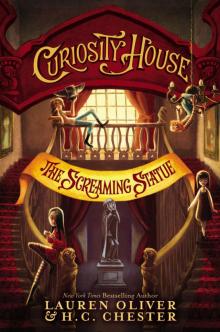 The Screaming Statue
The Screaming Statue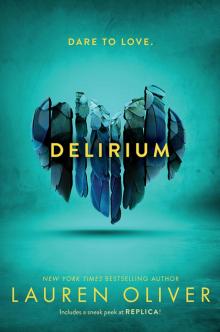 Delirium
Delirium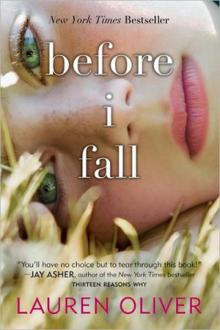 Before I Fall
Before I Fall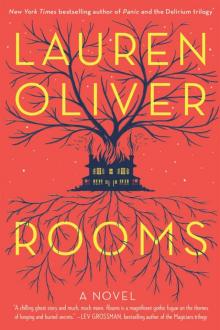 Rooms
Rooms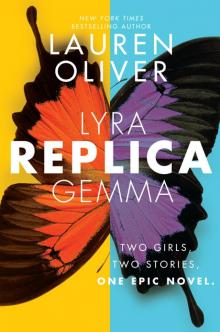 Replica
Replica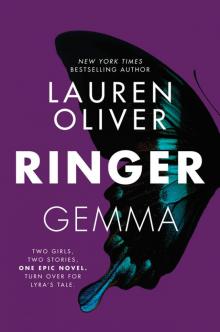 Ringer
Ringer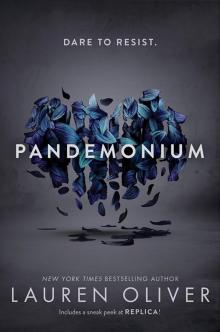 Pandemonium
Pandemonium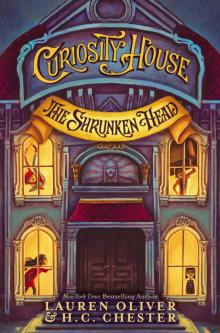 The Shrunken Head
The Shrunken Head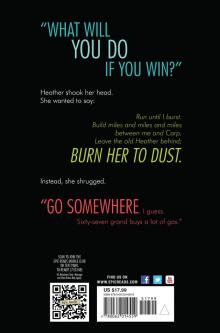 Panic
Panic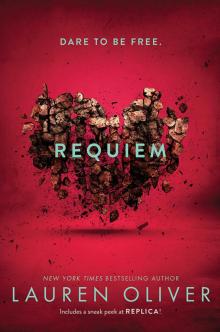 Requiem
Requiem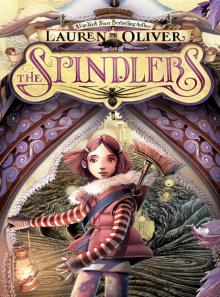 The Spindlers
The Spindlers Annabel
Annabel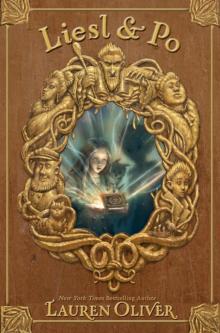 Liesl & Po
Liesl & Po Raven
Raven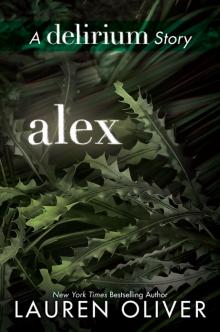 Alex
Alex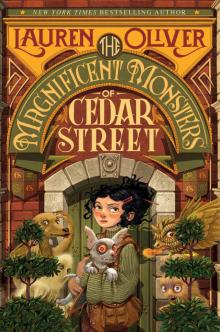 The Magnificent Monsters of Cedar Street
The Magnificent Monsters of Cedar Street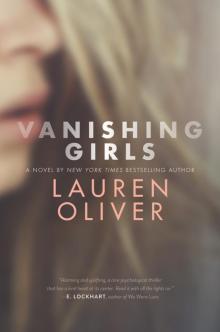 Vanishing Girls
Vanishing Girls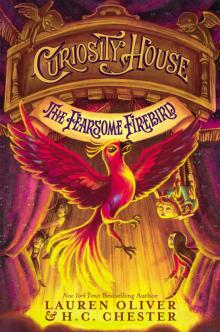 The Fearsome Firebird
The Fearsome Firebird Raven: A Delirium Short Story
Raven: A Delirium Short Story Annabel: A Delirium Short Story
Annabel: A Delirium Short Story Hana: A Delirium Short Story
Hana: A Delirium Short Story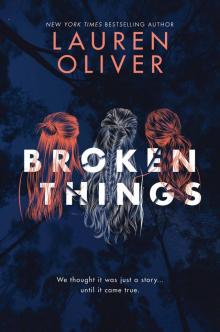 Broken Things
Broken Things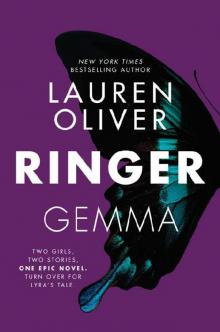 Ringer (Replica)
Ringer (Replica) Alex (delirium)
Alex (delirium)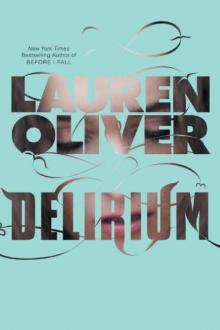 Delirium dt-1
Delirium dt-1